“To be nobody but yourself in a world which is doing its best, night and day, to make you everybody else means to fight the hardest battle which any human being can fight; and never stop fighting.” – E.E. Cummings
This September marks the tenth anniversary of the end of the ban on lesbians, gay men, and bisexuals in the American military that dates to World War II. This past weekend marked the retirement after 35 years of decorated service of one of its survivors, Major General Tammy Smith, United States Army Reserve; the highest-ranking out flag officer in the service, the embodiment of living authentically and a beacon of vital visibility.
In 1975, late former Air Force Technical Sergeant Leonard Matlovich became the first gay service member to purposely out himself to fight the ban. As his best friend and having been arrested along with 12 others protesting the ban at the White House in 2010, I was honored to be invited to Tammy’s two moving retirement ceremonies which, only a decade ago, might have been her discharge hearing instead. As a historian, I was surprised to see elements included in the program that unintentionally echoed the existence of gay people in the earliest days of our country.
Related: The secret lesbian couple behind a historic meeting at the White House
Friday’s retirement ceremony for Tammy and Brigadier General Ronald Stevens at Fort Meyer, Virginia, was staged by the 3rd U.S. Infantry, traditionally known as “The Old Guard,” the oldest active-duty infantry unit in the Army, dating to 1784. The Army’s official ceremonial unit and escort to the president, it provides security for Washington, D.C., in time of national emergency or civil disturbance. Its Sentinels guard the Tomb of the Unknown Soldier where I organized a wreath-laying in memory of the LGBT fallen in 2009.
Never Miss a Beat
Subscribe to our newsletter to stay ahead of the latest LGBTQ+ political news and insights.
One of the participants was Andrea Hollen who, in 1980, was the first of 62 women ever to graduate from the Army’s academy at West Point. After 12 years on active duty, she resigned rather than have to lie about being gay on a security clearance form.
In Conmy Hall Friday, nine units performed in individual, dramatic, bright cones of light; highly choreographed and rehearsed. The demonstration of military discipline and precision made me think of gay Friedrich Wilhelm von Steuben, the former Prussian officer, who arrived at Valley Forge in 1778 and became George Washington’s advisor, reorganizing and training the ragtag Continental Army so successfully that he’s credited with helping win our independence from Great Britain.
Four of the units wore replica uniforms of what their forebears might have worn during the Revolutionary War including the Fife and Drum Corps. Contrary to ubiquitous myth, we don’t know Lieutenant Frederick Gotthold Enslin’s actual sexual orientation but we do know that three weeks after von Steuben’s arrival in the camp Enslin was found guilty of “attempting to commit sodomy” and that Washington “with Abhorrence & Detestation of such Infamous Crimes order[ed] Lieut. Enslin to be drummed out of Camp.”
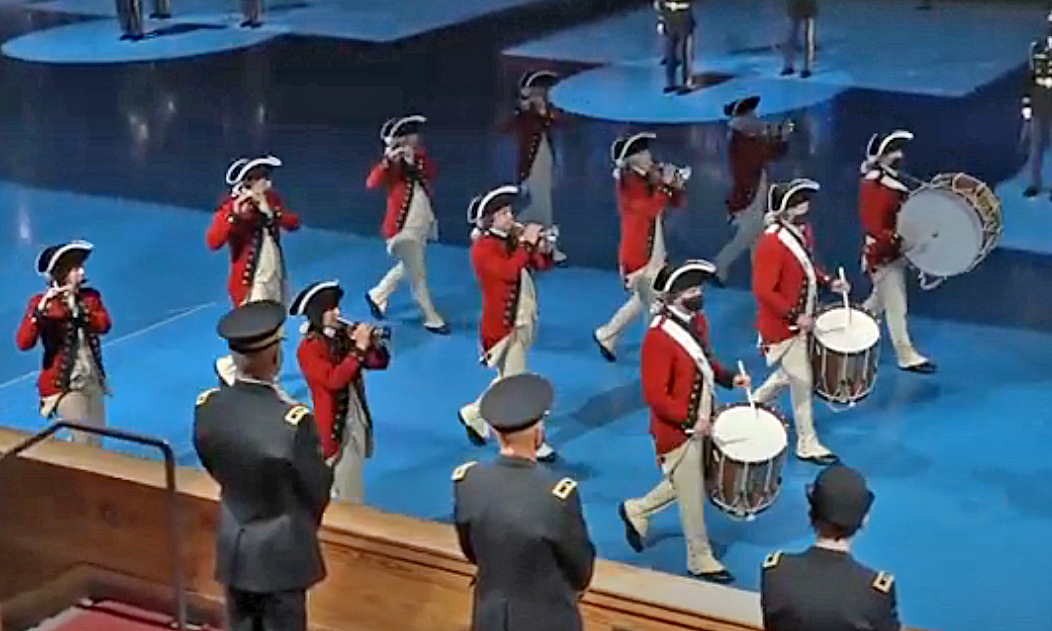
Lt. James McMichael wrote in his diary that Enslin “was first drum’d from right to left of the parade, thence to the left wing of the army; from that to the centre, and lastly transported over the Schuylkill with orders never to be seen in Camp in the future. This shocking scene was performed by all the drums and fifes in the army – the coat of the delinquent was turned wrong side out.”
However, on this day 243 years later, the Fife and Drum Corps, Continental Color Guard, Honor Guard Company, and the Commander-in-Chief’s Guard were all there to celebrate Tammy and General Stevens. At her request, likely another first, the U.S. Army Band added a unique element to the traditional, tightly scripted program. They played “Seasons of Love.”
Tammy’s second ceremony was held on Saturday in the Women in Military Service for America Memorial in Arlington National Cemetery where she made headlines and history coming out publicly in 2012 when her wife, Tracey, pinned the Brigadier General star on Tammy’s shoulder and their nine-year trajectory of representing our people with pride, distinctive service, and love across America and the world began; from campuses to corporations, from the House Chamber to the White House.
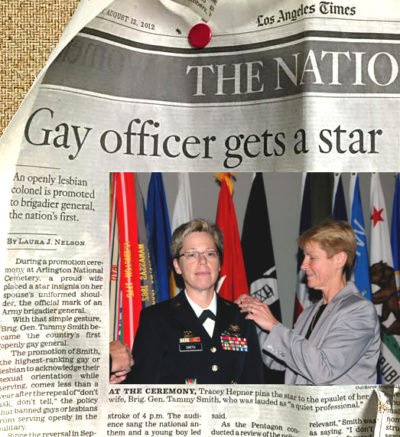
During this more informal ceremony, one of her former bosses, Deputy Assistant Secretary of the Army Marshall Williams, praised her at length. Some of her own former staff did, too, including Major Anna Ko, her aide-de-camp during what she considers her most significant and challenging assignment, Deputy Commanding General for Support in Korea, 2016–2017. “She was absolutely loved by everyone she met from military officials, civil authorities, and, of course, young soldiers. I was there for all her encounters; I would know.”
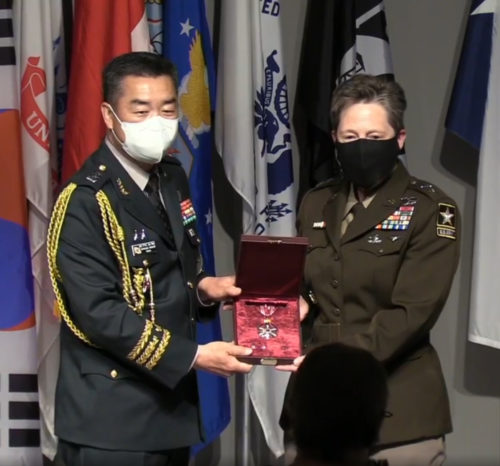
Major Ko introduced Korea’s Military Attaché to the United States who, on behalf of the President of the Republic of Korea, presented Tammy with their Order of National Security Cheonsu Medal, the highest honor they bestow upon generals, and a watch bearing the presidential seal. Nothing better demonstrates Tammy’s ability to build relationships than these gifts; not her Legion of Merit Medal nor her Meritorious Service Medals nor her Bronze Star.
And Tracey’s abilities, too, as she repeatedly appeared by Tammy’s side. The irony is that South Korean gays are forbidden to marry and to serve in the military as are transgender people. In March, a transgender soldier committed suicide after her discharge.
The competitive if quiet little girl with long pigtails in an Oregon town of less than a thousand people never imagined she would grow up to receive gifts from international leaders. She won awards raising rabbits as a member of Future Farmers of America (FFA), not dreaming of becoming a future general. But the public speaking skills she learned through FFA helped her earn promotion after promotion, including to Brigadier in 2012. At the time, there were fewer than 100 active-duty Army generals total, and only a handful were women.

Her many firsts, achievements, and path of promotions would be impressive enough for a man, but, even more than in civilian life, women in the military face far higher hurdles, and LBT women hurdles higher still even for someone with a Bachelor’s degree, two Master’s, and a Ph.D. For her glass ceiling came with potential bars on the windows.
The following timeline of her career is juxtaposed against only a few examples of what was happening around her in the military and society that might have killed anyone’s dreams. Nevertheless, she persisted.
In 2001, about 14 percent of the armed forces were women but 30 percent of the Don’t Ask, Don’t Tell discharges (up from 22 percent in 1997). Six percent of the Marine Corps, but 18 percent of Marine DADT discharges. Fifteen percent of the Army, but 34 percent of Army DADT discharges. Nineteen percent of the Air Force, but 43 percent of Air Force DADT discharges. – Servicemembers Legal Defense Network, 2002.
1982: Two years after a ruthless lesbian witch-hunt on the USS Norton Sound, Tammy, unable to afford college on her own, entered the University of Oregon on an Army Reserve Officers’ Training Corps (ROTC) scholarship. As she came to realize she was gay she also realized that she could lose the scholarship if they found out, and began to develop the compartmental skills of separating different parts of her life. During that freshman year, at least 1,998 service members were discharged for being gay, lesbian, or bisexual under the military’s policy ban dating to World War II – nearly 700 more than during the worst year after its codification as Don’t Ask, Don’t Tell (DADT): 1,301 in 2001.
That July, the first known U.S. service member with AIDS died. Like countless others after him, he had been afraid to admit even to his Army Medical Center doctor that he was gay, and, if the military’s homophobia wasn’t already bad enough, a still infamous chapter in its history quickly unfolded in which, for three years, it responded to AIDS not as a medical problem but as a homosexual problem, pressuring its own doctors to identify their infected patients so that they could be discharged as ipso facto gay, and often fighting to prevent those discharged from receiving the free medical services they needed and were due as veterans.
1986: Commissioned Second Lieutenant. The Pentagon discharged at least 1,644 for being gay, lesbian, or bisexual. That year’s graduates of West Point became the first service academy class to be required to participate in the mass testing for AIDS the Pentagon had ordered of all branches. At Walter Reed Army Medical Center in Washington, D.C., twenty-six-year-old Private First Class Michael W. Foster “tied his bootlaces to the hydraulic mechanism of a door leading to a rarely used stairwell and hanged himself” after testing positive for AIDS, and being lectured by a Walter Reed doctor who “felt obliged to quote the Bible’s incantations against homosexuality . . . even citing scripture about Sodom and Gomorrah.” – Randy Shilts, Conduct Unbecoming.
1987: Assigned to Panama. At least 1,380 discharges. Joe Steffan, in the Top 10 of his class and a Battalion Commander over one-sixth of the 4500 midshipmen at the United States Naval Academy, is kicked out simply for admitting he was gay just weeks before graduation. Reminiscent of the experience of Lieutenant Enslin in 1778, one superior attempted to humiliate him by ordering him to literally rip his Commander stripes from his uniform minutes before one of his hearings.
A U.S. Court of Appeals orders the Army to finally comply with the lower court’s 1980 ruling to allow Miriam Ben-Shalom to reenlist. She does the next year but the Army’s appeal is ultimately successful when the Supreme Court refuses to hear her case. The Court of Appeals for the Ninth Circuit would affirm a lower court ruling that the Army had the legal right to discharge her.
1988: Promoted to First Lieutenant. At least 1100 discharges. Former United States Air Force Technical Sergeant Leonard Matlovich, the first service member to purposely out himself to challenge the military ban and embed it in the national consciousness for the first time died of AIDS.
1989: Costa Rica deployment. At least 997 discharges. Possibly to cover up safety violations and training deficiencies, and with the involvement of the notoriously homophobic Naval Investigative Service (NIS), an explosion in the five-story gun turret on the USS Iowa killing 47 sailors including him was blamed on twenty-four-year-old Gunner’s Mate Second Class Clayton Hartwig by Navy officials who suggested that he was distraught over a failed relationship with another sailor on board. A dizzying variety of theories were tested with no unequivocal conclusions including whether Hartwig was actually gay.
Congressman Gerry Studds and Congresswoman Patricia Schroeder released to the public copies of the previously secret PERSEREC study (which someone had smuggled to them in relation to Steffan’s legal challenge to his dismissal) the Navy had first denied existed then insisted was meaningless because the researchers recommended an end to the ban.
“By the late 1980s the total number of men and women discharged as homosexuals or lesbians since 1941 approached 100,000.” – Allan Bérubé, Coming Out Under Fire.
1990: Tammy takes Army officer advanced course. At least 941 LGB discharges across the military. Women comprised 11% of the total forces but 21.4% of those discharges.
1991: Promoted to Captain, with a company command at Ft. Jackson, South Carolina. At least 949 discharges. Two planned workshops on lesbians in uniform during the National Lesbian Conference “prompted outrage from the Arab-American lesbian caucus, as well as among pacifist women who opposed lesbians joining the military altogether. During one angry confrontation, one lesbian pacifist punched a woman with the lesbian military contingent. When the veterans attempted to address the conference, they were not allowed to speak,” according to Shilts.
1993: At least 682 discharges. Tammy graduated airborne school and became the first female assigned observer/controller duties at a joint readiness training center. For tens of thousands serving in silence like her and thousands more of their supporters, the year began with a hope for emancipation despite a 1992 bill in Congress to end the ban having quickly crashed and burned after African-American Persian Gulf War hero and Chairman of the Joint Chiefs of Staff General Colin Powell called being gay “a ‘behavioral characteristic’ that could undermine military order and discipline – while denouncing discrimination based on what he called the ‘benign, non-behavioral characteristic’ of skin color.” (The Washington Post).
Collective memory and individual political agendas have long since blurred what actually happened, but the couch was already on fire when a sincere but naïve President Bill Clinton sat down on it that January with his promise to lift the ban; quickly growing into an inferno that engulfed his first year in office.
Religiofascists swarmed, including Rev. Jerry Falwell who repeatedly exploited homophobia to fill his coffers, and led a “dial-a-lobby” assault, overwhelming Congressional switchboards with 434,000 calls in a single day; five times the daily average. Powell threatened to resign, Clinton’s own Secretary of Defense and the Party’s Majority Leader in the Senate opposed him while homophobes in both houses of the Democratically-controlled Congress conjured the statutory version of the policy ban, colloquially known as Don’t Ask, Don’t Tell; virtually the same old wine but in a new bottle with a new name.
“The new Clinton White House and the existing cadre of gay advocacy groups were totally unprepared for the opposition they would encounter. In the hands of the religious right, [privacy concerns] quickly morphed into sweeping homophobic declarations that homosexuality threatened to destroy the military and, ultimately, Western civilization. With the help of [Democratic Chair of the Senate Armed Services Committee] Sam Nunn and Colin Powell, Christian conservatives [would] stave off Armageddon for a little while longer.” – Nathaniel Frank, Unfriendly Fire.
At the same time, LGB service members were being reminded of the ultimate price of military homophobia by the trial of one of the 900+ shipmates of 22-year old gay Radioman 3rd Class Allen Schindler. Subjected to extreme harassment aboard the USS Belleau Wood – “There’s a faggot on this ship and he should die” – Schindler was savagely beaten and stomped to death while on shore leave in Japan; so brutally that his mother could only identify his body by tattoos on his arms.
The Navy was no comfort to her. “It was left for a reporter from Pacific Stars and Stripes, an independent military newspaper, to tell her that Allen was gay, that he had met with a legal officer in hopes of getting off the Belleau Wood and that, according to a letter sent to the paper by three gay men who knew him in Japan, Allen’s death was the result of violence encouraged, if not permitted, by a climate of bigotry aboard ship,” The New York Times reported.
His murderer told an investigator that “I don’t regret it. I’d do it again. He deserved it.” and was sentenced to life in prison. None of this bloody horror changed the minds of Congress who passed the DADT bill in the Senate by a veto-proof 92 to 7 vote, and in the House by a veto-proof 301 to 134.
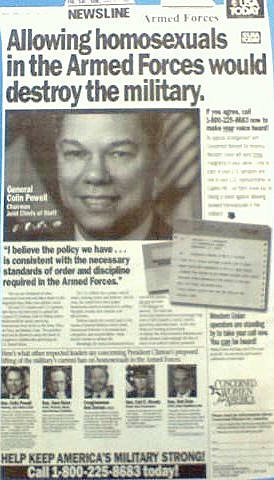
Nearly 30 years later most still repeat the shameless Pentagon claim that they were being magnanimous by “letting gays serve as long as they don’t tell anyone they’re gay.” It was always true, duh, that you could serve if they didn’t know, the law did not bar them from asking, and who would tolerate them saying “Blacks can serve as long as they pass for White”?
1996: She became jump master and senior parachutist. Left active duty, and became a member of an Army Reserve in South Carolina. At least 850 discharges.
1997: Promoted to Major. At least 997 discharges.
1999: Returned to full-time active duty in Army Reserve. At least 1,046 discharges. Fort Campbell, Kentucky, 21-yr. old Army Private First Class Barry Winchell, who some say identified as straight and others as gay, was harassed for four months by jeers of ”faggot,” ”queer,” and ”homo” after they learned he was dating a transgender woman. Even when told that Winchell’s own sergeant had called him a “faggot,” the base inspector general did nothing. Having been goaded into fighting Winchell and losing, two nights later, Private Calvin Glover, embarrassed and enraged after being taunted for having “his ass kicked by a faggot,” crushed Winchell’s skull with a baseball bat while he slept. Blood covered the walls and ceiling. His parents took him off of life support the next day. Glover was also given a life sentence.
Secretary of Defense William S. Cohen ordered top-to-bottom anti-harassment training, and President Clinton issued an executive order that amended the courts-martial manual to allow judges to weigh hate-crime factors in meting out sentences. Cohen also ordered a study that found that 80 percent of 71,570 soldiers surveyed said they had witnessed derogatory remarks being made against gays.
“But little do men perceive what solitude is, and how far it extendeth. For a crowd is not company; and faces are but a gallery of pictures; and talk but a tinkling cymbal where there is no love.” – Francis Bacon
In 2004 when there were at least 668 discharges, Tammy was promoted to Lieutenant Colonel, transferred to a job in the Pentagon – and, that October, fell in love with Tracey Hepner from Ohio on an Olivia cruise to the Caribbean.
“Prior to meeting her, I could kind of justify being in the closet. I had convinced myself that it was really a small price to pay because I wanted to be a military officer and all the things that went with that. But it actually got harder after I met Tracey because I couldn’t share her with my co-workers, with the world. I literally had to keep her a secret. That was the hardest period for me of living under [the ban], I had to keep the best part of my life from everyone,” she recounted.
“From being an ROTC cadet to first being commissioned in the military, with time it gets increasingly risky, the risk becomes more of what you have to lose personally. Your peer group becomes smaller with promotions in ranks, and when you think about how few individuals around you might be LGBT friendly – as a senior officer you’re less willing to socialize. It becomes more isolating because to avoid conversations about your personal life you inevitably avoid socializing with peers.”
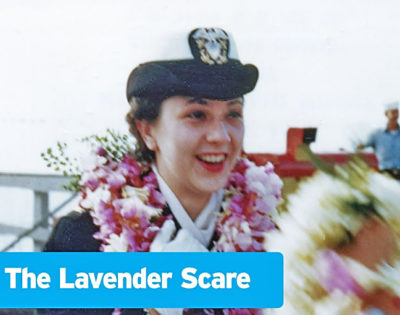
The parents and siblings of the late Joan Cassidy, featured in the documentary The Lavender Scare, had all served in the Navy. She enlisted in 1950, dreaming of becoming the first woman admiral. But after serving several years and working her way up to the rank of Captain she retired without pursuing another promotion, fearing her full identity would be discovered.
2008: During their second year of living together — Tracey had moved from Ohio and taken a job with Homeland Security and begun to document Movement events with her camera — Tammy was promoted to Colonel. A least 634 discharged. Army Major Alan Rogers, who had been active in the movement to repeal DADT, became the first known gay combat fatality in Iraq. Reprehensibly, The Washington Post agreed to a request from his surviving family and the Army to leave any mention that he was gay out of his obituaries, and an attempt to delete the fact from a Wikipedia article was traced to a Pentagon office.
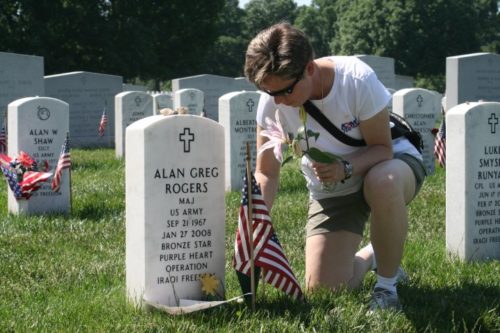
2010: Six years into her secret relationship with Tracey, and suffocating in the straitjacket of Don’t Ask, Don’t Tell, Tammy applied to retire, but changed her mind after hearing remarks about the repeal of the ban by Chairman of the Joint Chiefs of Staff Admiral Mike Mullen. While those attuned to the sound of bullshit heard the duplicity in the comments by Secretary of Defense Robert Gates, sitting next to him, Mullen seemed to have had a genuine epiphany after a long career that had supported discharges.
“It was as if he was speaking directly to me. For the first time, a senior military leader acknowledged that my service was just as valued as anyone else’s service. I cried. But more significant, I felt hope. And in that hope, I felt like maybe, maybe I should stay.”
Her commander let her withdraw her request and do a tour of Afghanistan after she agreed to apply for a general officer position on her return.
2011: She was in Bagram, Afghanistan when DADT repeal was implemented on September 20th. Tracey, who had created the Rainbow Ribbon Project to advocate for an end to the ban, cofounded Military Partners and Families Coalition, a support group for LGBT military partners and families; the org was sorely needed as the Obama Administration seemed not to have anticipated that open service would be far more complicated for those with families.
Time and again, even bright people simply assumed that the still-on-the-books Defense of Marriage Act (DOMA) forbade any benefits to married gay service couples without reading the actual relevant statutes. As late as 2014, after the Supreme Court negated the section of DOMA barring federal recognition of same-sex marriages, the Administration denied some benefits based on a section of military code that said that the laws of one’s state of residence trumped the state of celebration, i.e., if you lived in a non-marriage equality state it didn’t matter where you’d gotten married.
Though most issues were finally positively resolved, 694 service members had been needlessly discharged between January 2009 and repeal implementation simply for being gay or bisexual.

2012: That March, she and Tracey legally married in a ceremony at the Jefferson Memorial. In May, she learned that her promotion to Brigadier General had been approved by the Secretary of Defense. She decided it was time for her to come out publicly, and the promotion ceremony would be the perfect venue.
“I was scared to death, frankly. Now that I’m on the other side of it, I am so glad that we decided to take this particular path and just be authentic in who we are. It’s been an extremely positive experience.” Tracey accompanies Tammy to a huge variety of Major General-related events and the positive example they set as a couple is priceless.
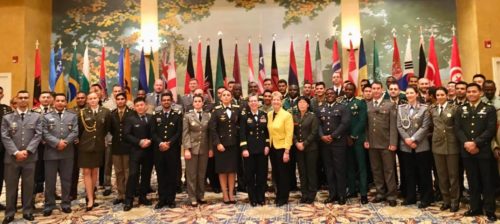
In 2013, Tracey was one of those invited to sit with Michelle Obama during the State of the Union. Afterward, she and Tammy talked with the First and Second Ladies at the White House.
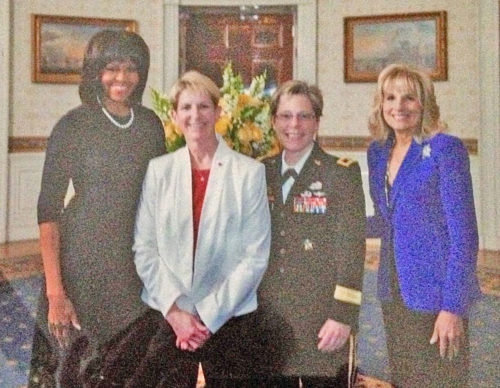
“How do you plan to up your game as a role model for youth? One kind word of encouragement can change a life forever. I want girls and young women to know that, yes, they can be a leader. Use your words for good.” – Major General Tammy Smith.
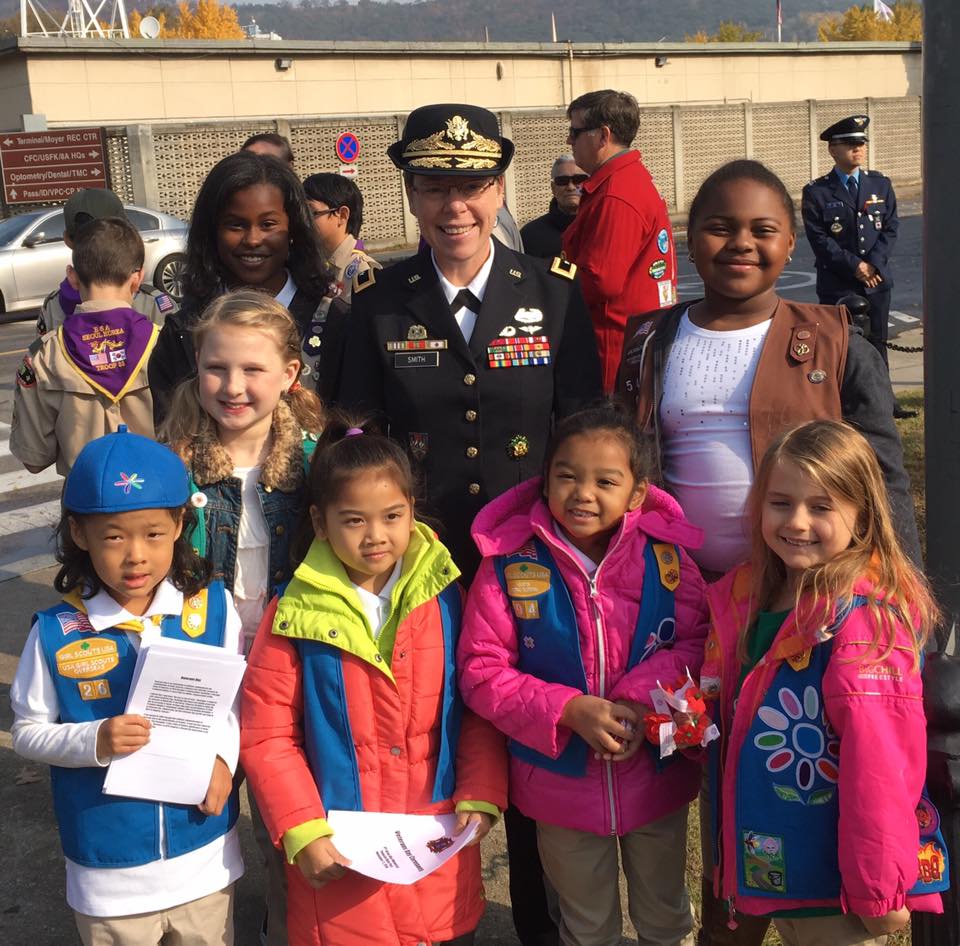
2014: Tammy was the guest of honor at the annual LGBT Veterans Day Observance next to the grave of Leonard Matlovich, and described the dramatic changes that had occurred in the military since she first visited the grave in 2009.
“When I came here the first time* I literally hid, even though it was a public event. And now to be able to come here on Veterans Day and acknowledge the service of all veterans is extremely moving for me,” she said. “I am thankful to the brave men and women who paved the way for me, who suffered both material sacrifice and hidden emotional anguish as they took a personal stand for open service. Because of these heroes, I could be honest about my life and my relationship with Tracey.”
“I think about the sacrifices and the personal courage of individuals whom I have personally met or whom I have been inspired by, some I never had the chance to know before they left the world. When people thank me for what I have done or express what my being an ‘out’ General Officer means to them, I know that living my authentic life while in uniform is meager repayment of the debt owed to those brave souls who sacrificed on my behalf without knowing me. They sacrificed for the ideal of me. These heroes put everything they had on the line for people they had never met, and they made a better world for people they may never know.
“To have stayed in the closet or to have excluded Tracey from pinning that star on my shoulder would have been a disservice to their sacrifice. We are in the debt of those who came before us. Pay it forward.”
*She was referring to a DADT protest and memorial service for Leonard which I organized as a part of the 2009 National Equality March. I didn’t know her then (or even that she existed) but met Tracey for the first time. Since then, two LGBT veterans groups, American Veterans for Equal Rights (AVER) and Operation Restore Heal Advocate (ORAH) have presented them with awards named in his honor.
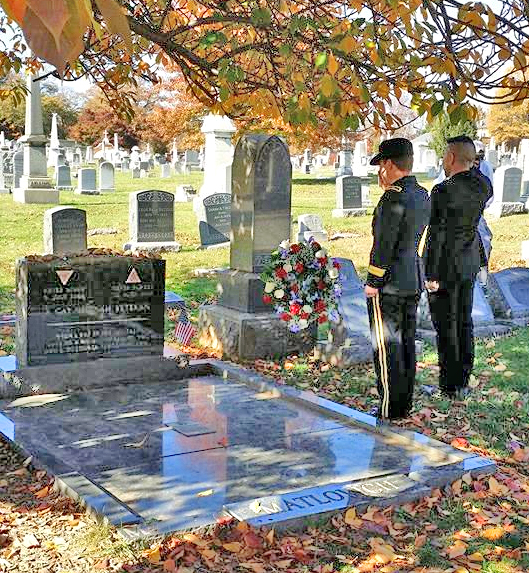
Both have repeatedly paid it forward although Tammy has had more opportunities due to her high-profile job. The results have not just benefited adults such as those who spoke of their gratitude during Saturday’s retirement ceremony. In 2015, she received a standing ovation from the freshmen members of George Washington University’s Women’s Leadership Program for her advice on“finding your authentic leader voice.”
Tracey recounted later, “She was talking to the students about not allowing others to stereotype you and gave a few examples. The ten-year-old brother of one of the students raised his hand, took the mic, and stood up. He asked what if others picked on you and said you were too slow, or too short, or too little? What do you do? Her response to him was so perfect that after the talk he came up to ask her another question, then spontaneously reached out and hugged her. A heart-melting moment.”
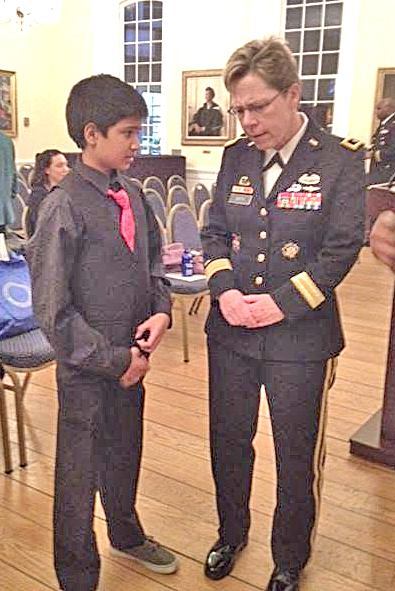
One of the mementos in the Welcome Bags we were given read, “Launching into the next 35 years!” Tammy may be out of uniform but not ideas of what more she can do to try to make the world that better place. She’s pondering the must-write book, of course, though I noticed that the otherwise glorious Women’s Memorial where we were Saturday is lacking any celebration of LBT women’s military history including hers. President Biden’s restoring open transgender service was critically important but the Defense Department’s official promotion each year of LGBT History Month which the previous Administration also erased must be resurrected. There’s much work to do to pass the Equality Act and the LGBTQ Servicemembers and Veterans Act, encourage and help a rapidly aging veteran population upgrade their discharge characterizations, promote more out LGBTs in government service, and insist on sharing our history accurately.
At the close of his discharge hearing in 1975 that ended his 12-year career, Leonard told supporters and the many reporters gathered, “Maybe not in my lifetime but we are going to win in the end.” A few weeks before his death from AIDS in 1988, he told the thousands at a gay rights rally in Sacramento, California, that “Our mission is to reach out and teach people to love and not to hate.”
No one has done that better than “T2”: Major General Tammy Smith and her wife and partner in authenticity and visibility, Tracey. In my heart, I kneel down.
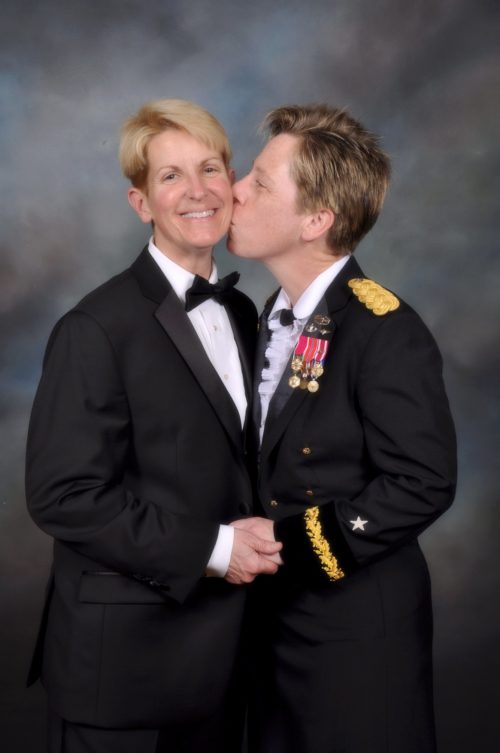
Video of the final retirement ceremony. Tammy’s closing remarks at 1:44:00.
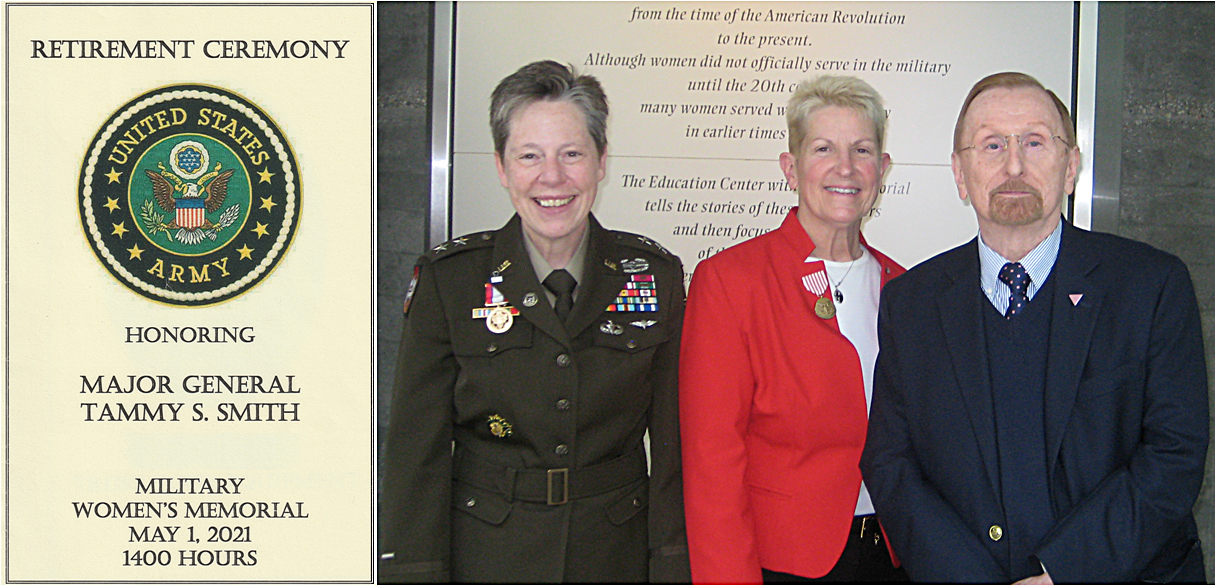
“If you can show me how to cling to that which is real to me, while teaching me a way into the larger society, I will sing your praises and I will help you make the desert grow fruit.” – Ralph Ellison.
Don't forget to share:













